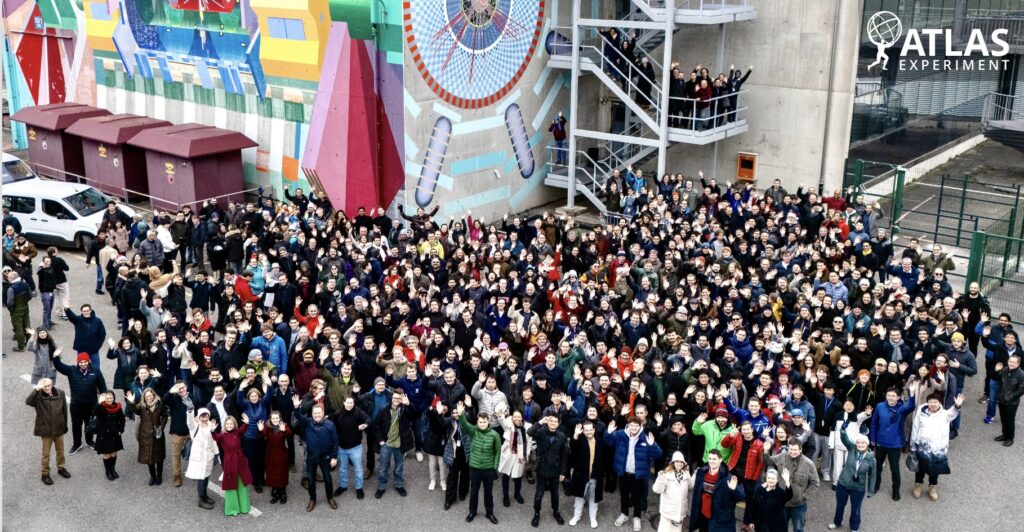
A team of 13,508 scientists, including over 100 from the University of Wisconsin–Madison, won the 2025 Breakthrough Prize in Fundamental Physics, the Breakthrough Prize Foundation announced April 5. The Prize recognized work conducted at CERN’s Large Hadron Collider (LHC) between 2015 and 2024.
The Breakthrough Prize was created to celebrate the wonders of our scientific age. The $3 million prize will be donated to the CERN & Society Foundation, which offers financial support to doctoral students to conduct research at CERN.
Four LHC projects were awarded, including ATLAS and CMS, both of which UW–Madison scientists work on. ATLAS and CMS jointly announced the discovery of the Higgs boson in 2012, and its discovery opened up many new avenues of research. In the years since, LHC researchers have worked towards a better understanding of this important particle because it interacts with all matter and gives other particles their mass. Both teams are actively engaged in analyzing LHC data in search of exciting and new physics.
“The LHC experiments have produced more than 3000 combined papers covering studies of electroweak physics and the Higgs boson, searches for dark matter, understanding quantum chromodynamics, and studying the symmetries of fundamental physics,” says CMS researcher Kevin Black, chair of the UW–Madison department of physics. “This work represents the combined contributions of many thousands of physicists, engineers, and computer scientists, and has taken decades to come to fruition. We are all very excited to be recognized with this award.”

ATLAS and CMS have generally the same research goals, but different technical ways of addressing them. Both detectors probe the aftermath of particle collisions at the LHC and use the detectors’ high-precision measurements to address questions about the Standard Model of particle physics, the building blocks of matter and dark matter, exotic particles, extra dimensions, supersymmetry, and more.
The ATLAS team at UW–Madison has taken a leadership role in both physics analyses and computing. They have spearheaded precision measurements of the Higgs boson’s properties and conducted extensive searches for new physics, including Dark Matter, achieving major sensitivity gains through advanced AI and machine learning techniques. In addition to leading developments in computing infrastructure, the team has played a crucial role in the High-Level Trigger system and simulation efforts using generative AI, further enhancing the experiment’s capabilities.
The CMS team at UW–Madison has played and continues to play key roles in trigger electronics systems, which are ways of sorting through the tens of millions of megabytes of data produced each second by a collider experiment and retaining the most meaningful events. They also manage a large computing cluster at UW-Madison, contribute to the building and operating of muon detectors, make key contributions to CMS trigger and computing operations, and develop physics analysis techniques including AI/ML. The CMS group efforts are well recognized in the recently published compendium of results, dubbed, the Stairway to Heaven.
CMS and ATLAS research at UW–Madison is largely supported by the U.S. Department of Energy, with additional support from the National Science Foundation.
The following people had a UW–Madison affiliation during the time noted by the Prize:
Current Professors
Kevin Black, Tulika Bose, Kyle Cranmer, Sridhara Dasu, Matthew Herndon, Sau Lan Wu
Current PhD Physicists
Pieter Everaerts, Matthew Feickert, Camilla Galloni, Alexander Held, Wasikul Islam, Charis Koraka, Abdollah Mohammadi, Ajit Mohapatra, Laurent Pétré, Deborah Pinna, Jay Sandesara, Alexandre Savin, Varun Sharma, Werner Wiedenmann
Current Graduate Students
Anagha Aravind, Alkaid Cheng, He He, Abhishikth Mallampalli, Susmita Mondal, Ganesh Parida, Minh Tuan Pham, Dylan Teague, Abigail Warden
Current Engineering Staff
Shaojun Sun
Current Emeriti
Sunanda Banerjee (Senior Scientist), Richard Loveless (Distinguished Senior Scientist), Wesley H. Smith (Professor)
Alumni
Michalis Bachtis (Ph.D. 2012), Swagato Banerjee (Postdoc 2015), Austin Belknap (Ph.D. 2015), James Buchanan (Ph.D. 2019), Cecile Caillol (Postdoc), Duncan Carlsmith (Professor), Maria Cepeda (Postdoc), Jay Chan (Ph.D. 2023), Stephane Cooperstein (B.S. 2014), Isabelle De Bruyn (Scientist), Senka Djuric (Postdoc), Laura Dodd (Ph.D. 2018), Keegan Downham (B.S. 2020), Evan Friis (Postdoc), Bhawna Gomber (Postdoc), Lindsey Gray (Ph.D. 2012), Monika Grothe (Scientist), Wen Guan (Engineer with PhD 2022), Andrew Straiton Hard (Ph.D. 2018), Yang Heng (Ph.D. 2019), Usama Hussain (Ph.D. 2020), Haoshuang Ji (Ph.D. 2019), Xiangyang Ju (Ph.D. 2018), Laser Seymour Kaplan (Ph.D. 2019), Lashkar Kashif (Postdoc 2019), Pamela Klabbers (Scientist), Evan Koenig (BS 2018, Intern), Amanda Kaitlyn Kruse (Ph.D. 2015), Armando Lanaro (Senior Scientist), Jessica Leonard (Ph.D. 2011), Aaron Levine (Ph.D. 2016), Andrew Loeliger (Ph.D. 2022), Kenneth Long (Ph.D. 2019), Jithin Madhusudanan Sreekala (Ph.D. 2022) Yao Ming (Ph.D. 2018), Isobel Ojalvo (Ph.D. 2014, Postdoc), Lauren Melissa Osojnak (Ph.D. 2020), Tom Perry (Ph.D. 2016), Elois Petruska (BS, 2021), Yan Qian (Undergraduate Student 2023), Tyler Ruggles (Ph.D. 2018, Postdoc), Tapas Sarangi (Scientist), Victor Shang (Ph.D. 2024), Manuel Silva (Ph.D. 2019), Nick Smith (Ph.D. 2018), Amy Tee (Postdoc, 2023), Stephen Trembath-Reichert (M.S. 2020), Ho-Fung Tsoi (Ph.D. 2024), Devin Taylor (Ph.D. 2017), Wren Vetens (Ph.D. 2024), Alex Zeng Wang (Ph.D. 2023), Fuquan Wang (Ph.D. 2019), Nate Woods (Ph.D. 2017), Hongtao Yang (Ph.D. 2016), Fangzhou Zhang (Ph.D. 2018), Rui Zhang (Postdoc, 2025), Chen Zhou (Postdoc 2021)